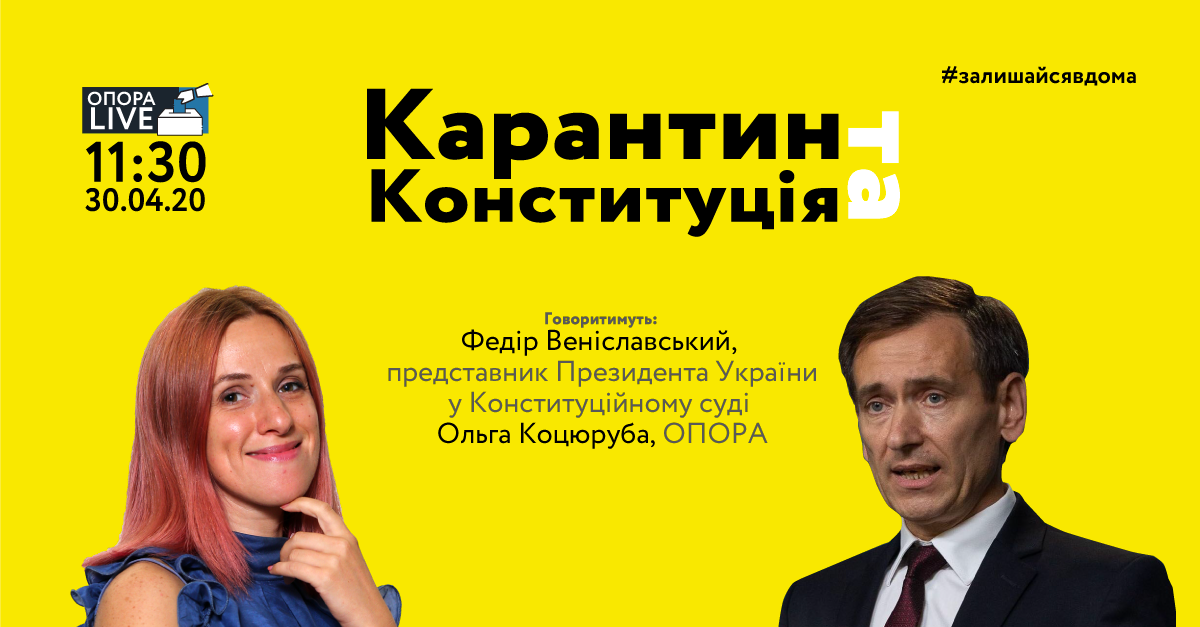Civil Network OPORA continues the traditional live streams every Thursday. “OPORA Live” is a format of mini interviews with stakeholders who could impact political processes in the country. Today’s guest speaker was Fedir Venislavskyi, a representative of the President of Ukraine in the Constitutional Court, a Member of Parliament, an expert in constitutional and municipal law, specifically in state building and human rights. Olha Kotsiuruba, a legal advisor at OPORA, asked the guest’s opinion about the constitutional nature of the quarantine measures and the lifting of immunity from people’s deputies, and also about the prospects for considering important draft laws in the parliament.
Yesterday, on April, 29, the Grand Chamber of the Constitutional Court started considering submissions from 50 MPs on the constitutionality of the Law cancelling the immunity for MPs.
According to Fedir Venislavskyi, a representative of the President of Ukraine in the Constitutional Court, the posture of the government, i.e. of the Presidential Office, is that the Verkhovna Rada of Ukraine fully complied with all the Constitutional rights and procedures setting any requirements for this draft law.
“Firstly, pursuant to the Law on the Standing Orders, Verkhovna Rada of Ukraine shall include into the agenda draft laws on the outstanding amendments to the Constitution, even without the voting for the agenda. In other words, the issue of introducing amendments about the immunity to the Constitution was supposed to be included by the Parliament, and it has been validly included into the session’s agenda. It is the first and most important thing – that there are no breaches in whether the Verkhovna Rada was entitled to consider that issue. It is the first and most important question – whether the Verkhovna Rada was entitled to consider the issue at all. It certainly was. Moreover, the draft law was supported by the Verkhovna Rada of the previous convocation. It had not been included to the agenda for the final approval. In other words, there are no legal grounds to claim that Verkhovna Rada was considering the draft law but failed to approve it,” says he.
The expert also informed that a key concern therefor is in the fact that the current legal system fails to provide for an absolute independence of the people’s deputies of Ukraine in case the immunity is lifted. However, he believes that content-wise there is an argument that various threats can be always found in court practices that might lead to infringements of MP’s rights.
Olha Kotsiuruba, a legal advisor at Civil Network OPORA also asked Fedir Venislavskyi as an expert in constitutional and municipal law, about the constitutionality of the current quarantine restrictions.
“We cannot reject the possibility of receiving constitutional complaints or submissions on the constitutionality of certain laws or resolutions of the Cabinet of Ministers of Ukraine declaring the restricting measures. That is why whenever an individual believes that their rights are infringed, they may apply to court. Thus, whenever a person believes certain laws or resolutions unconstitutional, they may apply with a constitutional complaint to the CCU, the same as legal entities may file a constitutional submission. However, as far as legal assessment for all these actions is concerned, as an expert in constitutional law of Ukraine, I sometimes find it strange to hear the opinions of some other experts. They claim a state of emergency shall be introduced; and under the International Covenant on Civil and Political Rights, they shall inform about civil and political rights, about the derogated rights, either proportionate, or no proportionate, etc. It’s all very good but we should keep in mind that in addition to the Law on Legal Regime of the State of Emergency, there are many other legal acts regulating activities of public authorities in the settings of such hazardous situations that cannot serve as the grounds for introducing the state of emergency. Instead, an emergency situation can be introduced under the Code of Civil Protection of Population, or pursuant to the Law on Protecting Population from Infectious Diseases, or the Law on Sanitary Epidemiological Welfare of the Population. There is a number of laws authorizing public authorities, such as the Cabinet of Ministers of Ukraine to adopt certain decisions,” says he.
Read more about this and other topics from the saved live on OPORA Facebook page: https://www.facebook.com/cn.opora/videos/230828391530404/
Or, on OPORA’s YouTube channel:
Every Friday, on OPORA Facebook page and on YouTube channel, you can watch the theme-based streams with people’s deputies from different factions, in the “Deputy Day” program.
You can learn more and figure out about the quarantine, the emergency situation, and the state of emergency from the summary of OPORA legal unit.
